Vanessa, ‘96, Peruvian. Literature major, so my standards are high enough to hate what I puke. [main: delusionrealism]
Don't wanna be here? Send us removal request.
Text
[12:06am] Chan isn't sure why it's so comfortable to fall asleep on the sofa as opposed to sleeping in his bed. But something about coming home from work late to see his sleepy wife waiting up for him, curled up in a blanket, makes him want to drop everything and rush into her arms.
Now, he does exactly that as he catches sight of his wife; she's almost asleep, her head falling to one side skd her blanket pulled tight around her shoulders. But when she hears her husband's footsteps, as familiar to her as her own heartbeat, she opens her eyes and her face cracks into a smile as she holds her arms out to him.
Chan smiles happily as he dives into his wife's embrace, his nose cold and his skin prickled from goosebumps as he buries his face into her neck. Y/N immediately rubs her hand in soothing circles over his back, her other hand curling around his fingers as she tries to telepathically transfer her body heat into him. The man chuckles lightly against her, almost as if he's over the moon to be in her arms, and Y/N hugs him tighter as they fall back against the sofa.
Chan peppers her face and her neck and anywhere else that's in reach with tender, loving kisses, before dropping his head against her chest. He wraps his arms around her waist and situates his legs in between hers as Y/N readjusts the blanket. She tucks it around his shoulders and chin before hugging him close to her. Then she drops a soft kiss onto his curls before shutting her own eyes, their souls mingling and carrying them to the same place in their dreams.
---
Tag list ~ @koos-euphoria @es-kay-zee @raethethey @hugs4chan @hotmesshapa @manonblackbeak-trash @hendsernoodle @stanskzseungmin @ateez-babygirl @dalamjisung @dinosdawn @cookiemonstermusic258 @strwbrryfroyo @gazelle-des-pres @qtieskz @stigmvta @necromancersupreme @super-btstrash-posts @changlix-mp4 @exonations @changboobies @jeyelleohe @rae-blogging @planetdemon @dani41 @jumbocircus @octalalica @velvetand-roses @foivetimesacharm @anaaam @waverzzzzzzzz @peachy-flxwr @justamessofablog @elizabeth11moreno @lenfilms @xhazmania @starshine-moon @justoutfromdead @snow-pegasus @lixiesbabyhands @bbychannie97 @laylasbunbunny @giventakenz @americanokisses @bluechans @minhosify @bellamuerte1987 @meowmeowisdaname @killer-quokka (let me know if you wanna be added or removed)
340 notes
·
View notes
Text
Drunk | Part 1 |
Description of Part 1: Matty Healy x Reader (Female) | When you come back home to Manchester from University, you get invited to a house party filled with your old friends from high school. You hadn’t seen most of them for 4 years and the house brings back some old memories of the parties you once attended. Getting drunk with old friends ends up being better than you imagined.
Word Count: 11.8k
Warnings: Drug use and maybe slightly NSFW smut? Idk (I’ve read worse)
A/N: So I sort of just saw this picture of Matty and got the inspiration to write about it. I had no idea where I wanted it to go when I started but I really hope you all enjoy it. I’m sorry ive starved you of Matty content for so long but with the start of Notes I thought everyone deserved a treat. If you all enjoy please let me know if you want a part 2 and if so, let me know if you want to be tagged. Hope you all enjoy, love you x
~*~*~*~*~*~*~*~*~*~*~
| MASTERLIST IN BIO |
~*~*~*~*~*~*~*~*~*~*~


Going to house parties was always fun. Throughout high school they were fun and at Uni the flat parties were on a different level. What was even better, was getting to have house parties with your school friends again once you were all actually old enough to drink.
Since leaving high school, you had only stayed in close contact with about 3 friends out of a group of 25. These three were Alisha, Caroline and your best friend, Y/B/F. You didn’t mind only being in immediate contact with them. When you saw the rest of them now and again, you got on like a house on fire. It was like you never left.
And of course, you replied to them in the group chat when someone made you laugh. You often kept a close eye on all the banter that was going on and they rarely failed to make you laugh. They were a crazy bunch and even you couldn’t deny that.
It was your third and final Christmas coming home from University and your school friends that you left behind couldn’t wait to see you again. You don’t know how they had managed it but apparently they had persuaded your old friend Steve to have another one of his famous house parties.
Afficher davantage
#still got it 😊#(also tag me pls I kinda like fantasizing about this guy and I love how you write his egocentric ass)
397 notes
·
View notes
Photo



Anyway, it’s Sascha Zverev’s birthday but I know he’d never read anything I wrote him, so I started with that premise. My life got in the mix- cue this poem, the first one I like in quite some time (yet I’m not brave enough to post somewhere with my face in the icon). It’s still probably crap, but whatever
0 notes
Text
Y'all: Why isn’t this character a perfect individual!!!
Me:

63K notes
·
View notes
Text
How to Get to Know Your Characters
@lourek asked:
Okay so it’s me again. I have a problem, cuz I really don’t know my characters?? And I’d like to get to know them. I know this might sound stupid, but do you have a masterpost about best ways to get to know your own characters or would you be willing to make one? I’ve noticed that all those “answer these questions” things are pretty useful. Thank you, I still worship you, good bye
Not a stupid question at all! This is one of the most challenging and important parts of becoming a writer. Getting to know someone takes time and effort, and characters are no exception.
So without further ado, here are my go-to techniques for getting to know a character:
1. Ask yourself these basic questions:
How old are they mentally/spiritually? Do they have an old soul, or are they a perpetual kid at heart? Does their personality not coincide with their physical age?
What do they care about most in the world? What would they die for?
What are their interests? What books, movies, and shows do they read/watch religiously? What do they geek out over?
What’s the most embarrassing thing that ever happened to them? Have they told anyone? If so, who?
On that note, what is one secret they’ve never told anyone?
What was their childhood like? Was it happy? Tragic? Why or why not?
How many relationships do they have? How have they affected them?
What is their greatest fear?
What was the best thing that ever happened to them?
What was the worst thing that ever happened to them?
If you had to describe the character in one word, what is the first that comes to mind?
2. Once that’s done, get nosy.
Empty their pockets, backpack, or purse. Make a list of everything inside. What do they always take with them? Why?
Describe their bedroom. Is it neat, or messy? Is it minimalist? Cluttered? Are they neat, or messy by nature? Is there any artwork on the wall, any posters? Are there lots of books? A TV? Stuffed animals? Be as detailed as you want to be, and think about why your character has these things and what they say about them.
If they have one, describe their car. What kind of car do they drive? How does it correlate with their personality, their career? Do they keep any photos of loved ones? Are there lots of fast food containers?
We’ve already touched on this briefly, but think about their books. Write down at least ten titles on their shelf. Think about what genres they like, what authors, and why they might enjoy them.
What kind of movie genres do they like? What kind of TV shows? Why do they enjoy them? Do they have any guilty pleasures that they’d rather anyone not know about?
Take a look inside their closet. What kind of clothes do they wear? What’s their style? Can they afford the clothes they’d actually like to wear? Are they preppy? Is their closet organized, or is it a hot mess?
3. Get to know the family.
What are their parents like? Do they have a good relationship? Are they friends? Do they just plain suck? If so, why?
If they don’t have a good relationship with their parents, are there any parental figures that their close with? What are they like?
Do they have any siblings? Are they close? Are they protective of them, or vice versa?
What is their nationality? Do they have strong ties to their heritage, or could they care less?
What about their extended family? Do they have any weird relatives? (In my opinion, every character should have at least one weird relative. They are a lot of fun to write.)
4. Fill in the details.
Brainstorm random questions about your characters, their likes, dislikes, et cetera. Here are examples:
What is their favorite food?
Their favorite beverage?
Their favorite movie?
Their favorite book?
Their favorite TV show?
What is their dream job?
Do they keep a journal?
Do they have good handwriting, or is it illegible from excessive note-taking?
What’s their favorite color?
What’’s their favorite kind of weather? Do they like sunny days, or rainy ones?
Can they draw? Are they artistic in general?
What kind of romantic/sexual partner do they like (if they’re interested in that sort of thing at all)? Do they have a ‘type?’
What would their ideal date be (even just with friends)? Do they like generic dinner and movie-type stuff, or do they favor museums and plays?
What would their ideal afternoon look like?
Do they prefer TV or books?
Are they introverted or extroverted? Do they hate social gatherings, or thrive on them? Do they relish in alone time?
Coffee or tea?
Cats or dogs?
Do they eat breakfast? If so, what?
What’s their opinion on pineapple pizza?
5. Fill out some character sheets.
Simple character sheets are a great way to fill in the gaps and get to know your character. Though there are quite a few floating around on my favorite blogs, but here are a few examples:
There’s a “lazy person’s” character sheet here.
There’s a “how to create a memorable character” sheet here.
And there’s a “no effort” character sheet here.
Of course, the only way to truly get to know your character is to write about them. You never know how they’ll develop until you get going, and once you do, they’ll never cease to surprise you. Characters truly do gain lives of their own, so don’t give up and keep writing.
And in the meantime, I hope this helps! <3
11K notes
·
View notes
Text
Editing & Proofreading Cheat Sheet
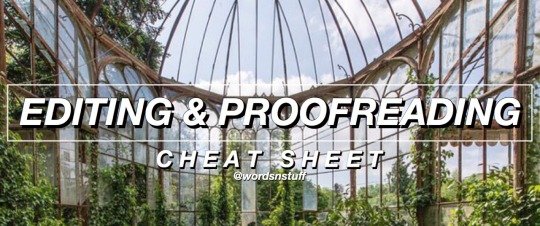
– A lot of questions I receive revolve around editing and proofreading, so I decided to make an extensive guide to editing your own writing. I collaborated with some amazing friends on this post so this is dedicated to them as well as all of you. I hope you find it useful. Enjoy!
Know The Difference: Editing vs. Proofreading
Editing is about the content, proofreading is about the technical detail and accuracy. Once you know the difference and you separate the two into different tasks, going through and actually doing it will seem less daunting. Deciding which to tacking first depends on what you’re like when you edit, but if you struggling with focusing on actually improving the content because you get distracted by grammatical errors and spelling mistakes, then proofreading first may be a good idea.
Be Intentional With Your Vocabulary
Avoid adverbs
Be frugal with unique adjectives
Only use dialogue tags when absolutely necessary
Be mindful of overused words
Take the time to find the right words
The words you choose can make all the difference so pay special attention to them.
Just Keep Snipping
A basic rule to editing that people often forget it, if it doesn’t serve a purpose, you should cut it out. A short book that is amazing all the way through is better than a long book that is redundant. Don’t worry about leaving your readers in the dark or not having enough content. As you edit, you’ll find ways and places in which to input more information.
Flow & Rhythm
This is the part where you make sure the writing itself sounds how you want it to. It’s important to read your writing aloud during this stage. Some things to pay attention to regarding flow and rhythm:
sentence length/variation
sentence structure
syllables and how they fit together
how your writing sounds out loud
Eloquence
Say it once and say it clearly. Redundancy bores readers so quickly, so when putting information forward, be clear, concise, and don’t add fluff. You don’t need to write a whole paragraph about how a character feels in a situation. It’s important to give the reader just enough to read between the lines.
Grammar
Common Grammar Mistakes To Look For
Subject-verb agreement errors
Sentence Fragments
Missing Comma After Introductory Element
Misusing The Apostrophe With “Its”
No Comma In A Compound Sentence
Misplaced Or Dangling Modifier
Vague Pronoun Reference
Wrong Word Usage
Run-On Sentence
Superfluous Commas
Lack Of Parallel Structure
Sentence Sprawl
Comma Splice
Colon Mistakes
Split Infinitives
List from here x {Explains these further and more in depth}
Improper Use of Phrases
“could have” not “could of”
“My friends and I” not “me and my friends” {If you take away “my friends” or “I”, or one of the nouns in a sentence in general, the sentence should still make sense}
“I couldn’t care less” not “I could care less”. This should be a no-brainer.
etc.. I could go on.
Familiarize yourself with these common mistakes and avoid making them at all costs. It’s also helpful to have someone read over it and let you know when they find issues with phrases you used. Please be attentive to these mistakes because making them can destroy your credibility as a writer.
Utilize The Senses
If you’re describing something in your writing, you should be slipping in words and little details that appeal to the reader’s senses, When editing, look for opportunities to slip in how a place smells, how a food tastes, how something feels to the touch, etc. It’s unbelievable how much this enhances your story.
Punctuation & Format
Punctuation Rules In English
the period (or full stop in British English)
the comma
the exclamation mark
the question mark
the colon
the semicolon
the quotation mark
the apostrophe
the hyphen and the dash
parentheses and brackets
Source x
When proofreading and marking up your manuscript, it can save a lot of time and energy if you use marks instead of actually write out everything, so here is a little chart I found that may be useful to you:
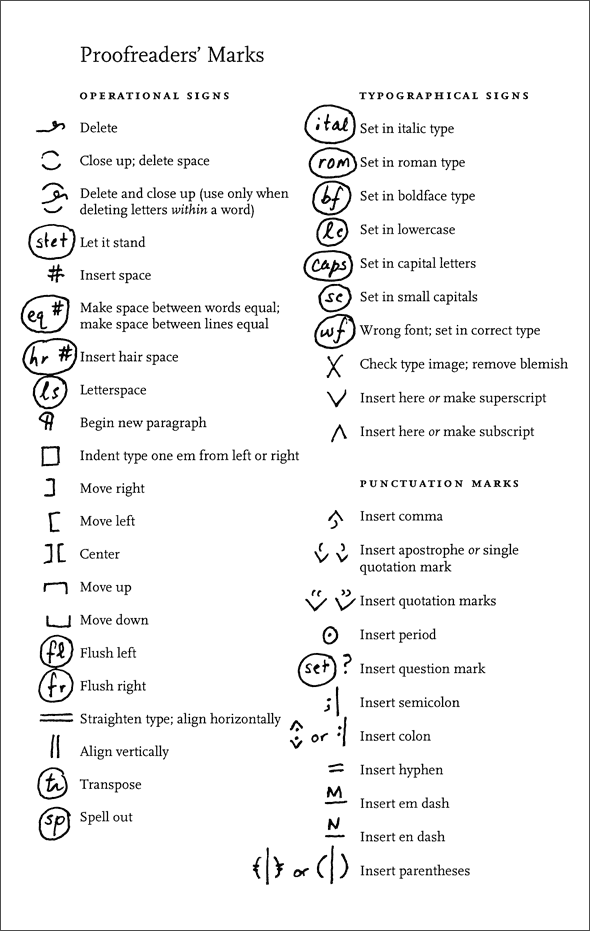
Other Things To Look Out For
Make sure you know who is talking
Keep tense consistent
Vary the tone from scene to scene
Run-on sentences
Inconsistencies in story details
Plot holes
Causes and effects of events are explained
Facts and technical details {Make sure you’ve researched them well}
Deviations from established background (know your story really really well and make sure your reader does too)
General Tips
Go in assuming that your work is full of errors. Maybe it’s not, but it’s better to be prepared for the worst and solve the issues now rather than when it’s too late
DO NOT BE SENTIMENTAL. Yes, easier said than done, but it’s possible.
Make the text less recognizable to yourself in order to catch details you may not otherwise.
Print out your manuscript and physically write out the changes.
Read your writing out loud. Sometimes writing looks like it makes sense, but in reality sounds wrong.
Do it in short periods over time so that you don’t inevitably get lazy with paying attention to little details
Keep in mind that editing usually takes longer than actually writing the draft because it is less fluid and requires more thought and problem solving.
Don’t rely on spelling and/or grammar checking software; they’re not always correct and can easily misinterpret what you’re trying to get across.
Check for a single error at a time. It may be time consuming and tedious but it’s more effective than the alternative.
Give yourself time and read slowly through it multiple times
Split up large chunks of text to make it easier to handle. Don’t go through your whole manuscript page by page as if you were just reading it as a book. Go chapter by chapter or scene by scene or even sentence by sentence.
If something seems off, investigate it. Don’t take a chance and leave it be. If you’re stumped, highlight it and have someone else look over it.
Have a strategy. Maybe not at first, especially if you don’t extensively edit your work regularly, but with time you’ll find what works for you and what doesn’t. Create your own system and use it to save yourself some time and confusion.
Support Wordsnstuff!
Request A Writing Help Post/Themed Playlist/Writing Tips!
Send Me Poetry To Feature On Our Instagram!
Receive Updates & Participate In Polls On Our Twitter!
Like us and share on Facebook!
Read More On Our Masterlist & See our Frequently Asked Questions!
Tag What You Want Me To See With #wordsnstuff!
Participate in monthly writing challenges!
11K notes
·
View notes
Text
Me while editing: *adds a sentence*
*finds nearly identical sentence in the next paragraph*

102K notes
·
View notes
Photo

The graphic above is based on a psychological study of tension and suspense in 2015.
>>BUILDING TENSION WITH THE SIX KEY COMPONENTS
CONFLICT: Your character wants something but they can’t have it - not without a struggle. Do they want to escape? Do they want to save someone? To create tension, it’s so important to make sure your readers know what your character’s goal is.
UNCERTAINTY: We need to make our characters fight for their goal by throwing obstacles at them. The more impossible the task seems, the more your readers will doubt your character will succeed.
ANTICIPATION: This is where foreshadowing comes in. If something bad is going to happen, allude to it and build that atmosphere. Inject fear into the hearts of your readers.
EMOTIONAL SIGNIFICANCE: If we want our reader to want to see our character succeed, then we need to make sure there’s an emotional reason for them wanting this goal. What will happen if they fail? The stakes need to be clear and important to our character in order to make our reader care.
LACK OF CONTROL: One way to increase tension is to pile obstacles onto your character which are beyond their influence. If they feel lost despite their efforts, achieving their goal seems more impossible and, as mentioned above, that helps build “uncertainty”.
TEMPORAL ASPECTS: If your character has a set time in which they must achieve their goal, then will this add a ton of tension. And if you have succeeded in making clear, emotional stakes then the reader will be biting their nails as they count down alongside your character.
If you feel your manuscript is lacking in tension, analyse it for the six above components. Every story needs “conflict”, “emotional significance” and “uncertainty” to be obvious. If you are confident all three are clear, then try ramping up “lack of control”, “anticipation” or “temporal aspects”. All six aspects should be present for a story to really shine, but sometimes they might be more vague. For example, it might not be a set time limit but an inevitable event and this also touches on anticipation and lack of control.
3K notes
·
View notes
Text
The 10 Elements of a MAIN CHARACTER
To all the writers who have ever been told “Your characters have to be three dimensional!” or “They should be well-rounded!” and just felt like saying: “What does that even MEAN?! What goes into a 3-dimensional character? Specifically? And how do you go about creating one?!”

Good news. There’s a way.
Great main characters – heroes, protagonists, deuteragonist, whatever you want to call them – have ten things in common. Ten things that are easily developed, once you know what to create within your character. So no one will ever be able to tell you “needs to be more three dimensional!” ever again. Ha.

1) Weaknesses: Main characters should be flawed, but I’m not saying this because it will make them more realistic (though it will) – I’m saying they need to be flawed because if they’re not, they shouldn’t be a main character. Story is another word for change, or more accurately, character growth. Not character as in “fictional person”, character meaning “heart and soul”. Story is someone’s character changing, for better or worse. Main characters at the beginning of the story are lacking something vital, some knowledge of themselves, some knowledge of how to live a better life, and this void is ruining their lives. They must overcome these weaknesses, if they’re going to become complete, and reach a happy ending. There are two types of weaknesses: Psychological and Moral. Psychological ones only hurt the main character. Moral ones cause the main character to hurt other people. Easy.
2) Goal: Characters exist because they want something. Desiring something, and the fight against opposition for that desire, is the lifeblood of story; and because character is story, it’s also desire that can breathe life into words on a page, and begin the process of creating a real person in a reader’s mind. It’s this ‘desire for something’ that sparks that first connection between reader and character. It makes us think “Well, now I have to find out if this person gets what they want.” This is a powerful link. (How many mediocre movies do we suffer through, when we could easily stop watching, because we’re still trapped by that question of “what happens?”) So if this is powerful enough to keep people watching an annoying movie, imagine how powerful it can be in an excellent story.

Like in Up, the goal is to get the house to Paradise Falls.
3) Want: If the main character wants something, they want it for a darn good reason. Usually, they think that attaining the goal will fill the void they can sense in their lives, the deficiency they can feel, but don’t know how to fix. And they’re almost always wrong. Getting the goal doesn’t help anything; which is why, while pursuing that goal, they discover a deeper need that will heal them. Which brings us to …
4) Need/Elixir: Main characters are missing something, a weakness in their innermost selves is causing them to live a less-than-wonderful life. Through story, these main characters can be healed. Once they discover what’s missing, and accept it, and change the way they live to include this truth they’ve uncovered … they’re healed. Learning this truth, whatever it is, forms the purpose of the story for the main character. The reader, and the character, think the story is about achieving that big tangible goal the premise talks about; really, underneath it all, the story is about someone achieving a big intangible truth, that will ultimately save their life and future. Often, this need is exactly what the character fears or professes to hate.
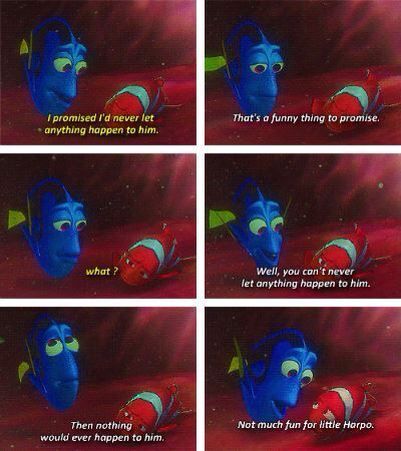
Like Finding Nemo, where Dory states exactly what Marlin needs to learn.
5) Ghosts:
Not this kind of ghosts.

Ghosts are events in your character’s past which mark the source of their weaknesses and strengths. Because these happened, the character became who they are. All we need to know about backstory are these moments, because who the character became is all we care about. There’s really only one ghost you absolutely need: the source of their moral and psychological weakness. Something happened that knocked the character’s world off kilter, and everything from that moment onward has been tainted by what happened. This moment haunts them (hence the name), and holds them back from uncovering that need that will heal their weaknesses. Pixar are masters of this: the source of Carl being stuck in the past, curmudgeonly, unable of loving anyone new? Ellie dying; his ghost. In Finding Nemo, the source of Marlin being suffocating, protective to the point of being harmful, possessive, and fearful? His wife and 99% of his children being eaten in front of him; his ghost.
6) True Character: These are the strengths, values, convictions, fears, faults, beliefs, worldview, and outlook on life that make the main character who they truly are.
7) Characterization: This is everything on the surface of a main character. The way they look, talk, act, etc. All of this originates from those deeper elements of their being, the strengths, values, ghosts, weaknesses, needs, that make them who they truly are. So often, you can think of this as a facade they’re projecting, a way to shield the the truth about themselves, how they wish to be perceived. The story, and the other characters, are slowly going to see deeper than this characterization, revealing more and more of the reasons it is the way it is.
8) Arc: If the character is going to change from “Incomplete Person” to “Complete Person” there’s going to be a journey they go on to make that possible. The external story, the pursuit of that big tangible goal the premise is about, is causing an inner journey to take place. What they have to do in pursuit of that external goal will apply pressure to those weaknesses, and pressure causes change. This process has seven steps, but if I write it all here this post is going to be obscenely long. So I might wait and give this its own post.
9) Changed Person: Who is the character going to be at the end of this story? They better be different, or else the story didn’t work. How do they show how different they’ve become? What is the moral choice they make, that spins their trajectory from “the future doesn’t look so great” to “happily ever after”? This should be known right away, maybe even before anything else is settled about the character. This gives a distinct end goal, a way to work backwards, a destination in mind that you can navigate towards.

10) Fascination and Illumination: The surface characterization, and the brief glimpses of the true character underneath create curiosity in the reader/audience. What the character says, and the implied subtext beneath the dialogue, creates a puzzle the audience wants to solve. Actions they take work the same way; if the writer indicates there’s deeper motivation behind why a character behaves in the way they do, we buy into solving that mystery right away. We can’t help it. “Who are you really? Why are you the way you are? And how is that going to effect the story?” These are all the unspoken, almost not consciously acknowledged, questions that fascinating characters provoke. Searching out meaning, connecting the dots to find the truth – we can’t resist this. We’re not fascinated by tons of backstory and exposition about a character; we’re fascinated by story, by mystery, by the technique of withholding information and having to interpret and hunt out the truth on our own. So gradually, the story and the characters will force that character to reveal a little more, and a little more, until we have a complete picture of who this person is. Crucial that this information isn’t told up front. Gradually illuminate it. It’s just like getting to know a real person.
So how does this work in a real character? Let’s take a look at Flynn Rider/Eugene Fitzherbert, because almost everybody has seen that movie.
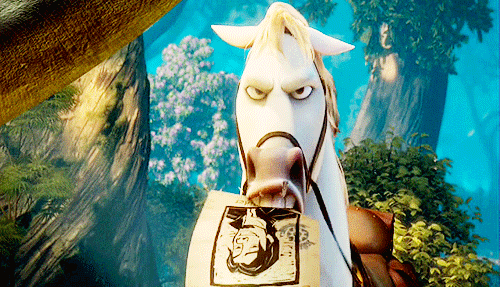
Moral Weaknesses: He’s selfish. He’s a little greedy. He’s a little rude. He uses his charisma and bravado to keep people at a distance from the real him.
Psychological Weaknesses: Insecurity, fear of vulnerability, feels like the real him (Eugene) would be unwanted, unlovable, and have nothing – just like when he was an orphaned kid. Also, he doesn’t know who he wants to be, what he wants to live for.

Goal: Flynn wants to get that crown. So he has to get Blondie to see the floating lights, so she’ll give it back to him, and then they can part ways as unlikely friends.

Want: Why does he want the crown? What does it mean for him? He actually states it (reluctantly) in song: “I have dreams like you, no really. Just much less touchy feely. They mainly happen somewhere warm and sunny. On an island that I own, tanned and rested and alone. Surrounded by enormous piles of money.” He senses there’s something off in his life, something is missing. But he mistakenly believes this missing piece is money, which will allow him to buy a lonely island, where he can live out his days as Flynn and no one will ever know Eugene.
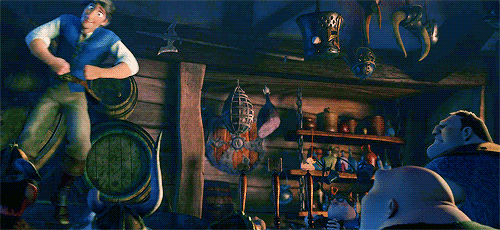
Need: “All those days chasing down a daydream. All those years living in a blur. All that time never truly seeing, things the way they were. Now she’s here, shining in the starlight. Now she’s here, suddenly I know. If she’s here, it’s crystal clear, I’m where I’m meant to go.” He wants a crown … he needs to fall in love with Rapunzel. He needs to love something more than himself, and find out that love isn’t something to fear and push away. He needs to abandon the ‘Tales of Flynnagin Rider’ ambition, and get a more worthwhile, new dream.

Ghost: The source of all of his weaknesses can be linked to his “little bit of a downer” childhood as an orphan. Interestingly, he isn’t aware of another facet of that ghost, and Rapunzel points it out to him. “Was he a thief too?” she asks. He looks taken aback, before answering “Uh, no.” Something’s gone wrong. The choices he’s making are not living up to that original role model.

Characterization: Flynn’s charming, funny, smart, charismatic, and arrogant (in a somehow charming sort of way). He’s also rude, contemptuous, and sarcastic. All traits that help him keep up that 'swashbuckling rogue’ facade, and push people away from the real him.
True Character: Underneath all that, he’s a Disney prince. That pretty much sums it up.
Changed Person: “Started going by Eugene again, stopped thieving, and basically turned it all around.” He started the story as the guarded and evasive Flynn, he ends as the selfless and thoroughly-in-love Eugene.

Fascination and Illumination: Imagine if everything about Flynn had been told, right up front. We know he’s an orphan, we know he’s upheld a fake reputation, we know he’s a kind and loving guy underneath it all, we even know about his “tales of Flynnagin” childhood dream. You know what happens? We like him … but we’re not interested in him. There’s nothing we need to find out. There’s no curiosity. And if there’s no curiosity, and nothing being illuminated, your story’s not going anywhere. So instead, we find out – alongside Rapunzel – more about Flynn as the story progresses. And that is how it should be.
So!
Developing characters in this way, I’ve found, really reduces worries about how “well-rounded” and three dimensional I’ve made them. They feel real to me. And besides helping me create characters, this ten element technique has also let me analyze characters I like, which is strangely fun. It’s a great way to figure out why a character works, what causes them to be so effective, and how you can go about creating them yourself.
Yeah, I’m a bit of a nerd.
But if you want, try it out. Develop a character. Analyze a character. You might find it as useful/fun as I do.
29K notes
·
View notes
Text
How to Return to your Manuscript

Every writer knows what it’s like to set a manuscript down for an evening and just… not pick it up again.
Usually when this happens, we have every intention of returning to it the next day, but for some reason or another, we don’t.
One day turns into a week. Which turns into a month. Maybe two.
The longer the manuscript’s been set aside, the harder it becomes to pick up again. It turns into this dark, hulking presence lurking at the edge of your consciousness, like something in a horror movie, eating away at that piece of your identity labeled “writer.”
The reasons for not picking it up may change, but there’s always one.
You may not know where to start again, or doubt that your abilities are up to the standard its plot or characters require. You may not know where to find the time to write anymore. You may have even sat down to write just a few minutes ago, and ended up here on Tumblr instead, unable to bring yourself to open the manuscript file.
If you’re reading this post and feel personally attacked…

Don’t fret.
I have a writing exercise for you.
Set aside ten minutes of your day to look at your manuscript.
I recommend reading the last scene you completed, but this is your manuscript and your time. You can look at the first page. Or that one scene in the middle that you actually kind of like. Just don’t look at a blank page. Blank pages are scary and this is all about eliminating writing anxiety.
Personally, I make this the last thing I do in the day, so I go to sleep with my manuscript in my head. Sometimes it helps to let my unconscious mind have a go at sorting through what I’ve read. However, I think it’s helpful to do this before any long period of time when you can let your mind wander. You may find writing more helpful before work/school or during lunch. Before a commute. Whatever works best for you.
But don’t write and don’t look for more than ten minutes.
You’re not allowed to change a single thing in the document. Not a comma. Not a misspelled word.
When the ten minutes are up, simply close the document and go on with your day/night.
There will probably be some things that you do want to change in the manuscript. They may be very simple, sentence-level fixes, but they may be as big as an idea for continuing the scene or the start of the next chapter. Let those thoughts sit with you, instead of all of the manuscript doubt and anxiety that were sitting with you before.
And yes, keeping your time down to ten minutes is important. You want a focus on a bite-sized portion of the manuscript. If you read too much, you’ll give yourself too much to consider for the next day, you’ll find too much to change, and you’ll run the risk of making your work as anxiety-inducing as ever.
The next day, sit down with your document for another ten minutes.
Allow yourself to make the changes you didn’t make the first day, or ones you’ve come up with since. This may mean adding a few commas and removing a few ‘that’s. This may mean continuing with the scene. Ten minutes is the perfect amount of time to set down a good paragraph. Try that.
Again, force yourself to stop after ten minutes, even if you’re on a roll now. The stopping means that you have to keep all of those changes that you’re excited to make inside your head. It means that your thoughts about your manuscript are good and productive. It’ll keep you looking forward to your next writing session. Key advice: at the end of every writing session, always leave an edit in your head. It’ll be that small, tangible thing you can start with in your next session.
Rinse, repeat, and develop a routine.
Sit down for at least ten minutes every day. Make it a routine. Once the manuscript is open, do whatever feels comfortable to you: whether that means reading a chapter, editing something old, or writing something new.
If you’re coming up with edits and scenes that simply require more than ten minutes, start amping up your writing time. Write for an hour. Write for two or three.
Have a super busy day and know you can’t write for an hour? Those ten minutes are still fine. They’re still enough. Never feel like having spent three hours writing yesterday means you have to spend three hours writing today. Never feel like a failure for not spending X hours a day writing. That will only lead to not writing at all.
What if you get stuck again? Go back to a shorter writing time, go back to reading and not writing. Reduce the pressure you’ve put on yourself and relax your expectations. The most important thing is simply returning to your manuscript every day whether you have something good to set on the page or not.
Never got un-stuck in the first place? That’s still okay! Keep spending your ten minutes with your manuscript. Write or just read. Keep it in your thoughts. Make it a defined, real, thing instead of that monster lurking in your head. It may take time, but eventually, something will click, and by that point, opening that file and getting started will be a piece of cake.
If you are able to write for an hour or two each day, you may find it useful to continue setting aside ten minutes each evening to read that day’s work–read but not edit–and keep a few edits in your head for the next day’s session.
By the end of a week, whether you’ve written a hundred new pages or fixed a lot of bad grammar, you’ll at least be in a place where you’re once again thinking about your manuscript in tangible terms, as a thing made up of words and paragraphs instead of anxiety and blank pages.
Maybe in the end, you’ll decide that you simply need to abandon this story and pick up a new one. If this happens, you’ll be in a great place to start, with a writing routine already in place.
More likely than not, just spending time with your story will fan up your love for it again. And once more, your manuscript will be the annoying, stubborn, untameable child you adore instead of a lurking horror.
For more advice on working through writer’s block, check out another post of mine: What to Do When You Can’t Write

3K notes
·
View notes
Note
Can you give a few bullet point tips on describing someone's features in first person?
I can do my best! But let me preface this with the fact that I haven’t written in first person POV in years, nor do I read much written in first person. (I personally prefer third limited, but there’s nothing too significant about it; I simply have a handful of style preferences.) That being said, in the time before I transitioned from writing first person to third person, I did learn a few things.
1) Don’t get too long winded. You don’t need to go into full detail of how the character looks straight away—while it’s great that he’s wearing a distressed denim vest that fits snugly against his chest, that doesn’t bring much to the story. Try to keep your description to things that are uniquely identifying traits or symbolic. (This can include someone having rat-like features if they’re suspicious or owlish eyes if someone is wise and timid.) Simple can be better.
2) Don’t rush the description. You don’t need to tell us everything about how a character appears immediately. If they’re important enough to describe, they’ll probably appear again and you can describe things further. Your narrator likely isn’t going to analyze everything about their appearance when they first meet; I know I certainly don’t. Consider having your narrator note things about their appearance later on, as they grow closer/encounter each other more frequently.
3) Get creative. Or don’t. Because frankly, it doesn’t matter! Especially in the case of a first person narrator, there’s no need to explain that “her blue eyes sparkled, reminding me of the lake trips I used to take with my family during the summer” or that “their hair fell forward, scattered in front of their eyes like the first few snowflakes of the season.” If your narrator isn’t the most artistic and wistful person, this might take away from the scene more than anything. If your character prefers to say things short and simple, saying that “he had brown hair tucked underneath a beanie and a scowl on his face” is perfectly fine! Do what fits your character and your style best.
195 notes
·
View notes
Text
Quick writing tip
Dont worry about the details when you’re writing your first draft.
If someone is holding something, or standing a particular way, or putting on a certain item of clothing or you’ve written the weather is sunny, try not to fret if the subsequent actions match.
Don’t worry if you never mention the item again. Don’t worry if you don’t take off that jacket or if it’s raining.
None of that matters in the first draft. Your first draft is supposed to be messy. It’s supposed to not make sense.
Don’t focus on getting everything right, just focus on getting the words down.
Make it right later.
925 notes
·
View notes
Photo

[A tweet from Lauren DeStefano: Writing is like reading except the book is trying to kill you] (source)
118K notes
·
View notes
Text
Prompt 62 - Paulo Dybala
The Champions League meant travelling. Travelling meant jetlag. Jetlag meant you couldn’t sleep.
You tried not to toss and turn with Paulo resting beside you, but it was so hot in this hotel room- you had chosen the side of the bed closest to the heater- and the English always kept the heaters on in winter. Duvet off was too cold, duvet on was too hot, your pyjama top had long since been discarded and the heat rolling off Paulo was almost unbearable.
Almost.
Being with him, despite the heat, despite the loss they had suffered at Wembley, despite the fact he had actually cried tonight after missing the penalty, it was something you cherished. Being able to see him so vulnerable tonight- both with the tears but also in sleep, sleep making him look so young and peaceful- it just made your heart ache with love for him even more.
Eventually, though, your tossing and turning began to make him stir, his arms falling around you, his head moving to rest on your stomach, his legs tangling with yours as his eyes slowly blinked open and registered you were awake. He pressed light kisses to your stomach, hands trailing down to hold yours as he looked up at you, hair all sleep mussed, eyes still tired.
“Can’t sleep, princesa?”
“Jetlag,” you said as he sat up, opening his arms for you to fall into, “and it’s too hot.”
“You’re too hot,” he commented, leaning over and kissing your shoulder as you laughed at his flirtation, “you’re the hottest thing in this room.”
“Stop,” you laughed, as he continued kissing, his mouth lazily moving from your shoulder to your neck and then to your collarbones. He hovered above you, his skin literally a furnace, his eyes now smouldering like open coals, so different from the sleepy sunset they had been minutes before.
“If you can’t sleep… we could have sex?”
“It’s too hot,” you whined at him and he laughed low in his throat, his lips now moments from yours as he whispered to you in the darkness.
“We could take a shower.”
“It’s 3am,” you said, “we have to be up in three hours to get the flight.”
“It’s morning, morning sex is your favourite,”
“Baby,” you smiled at him, “I love you, you’re gorgeous, but not now.”
“Ok, lovely,” he replied, settling back down beside you, taking your hand and pressing his lips to the back of it, “I love you too.”
“Try and sleep,” you replied, running a hand through his hair, making his eyes flutter shut as your nails massaged him, letting your eyes fall shut as you settled beside him, tucked into his chest, his breath a metronome on your forehead.
You were almost asleep, almost, when he whispered to you, the question making you laugh- with surprise at what he said but also with awe at how you managed to get the most perfect man in the world to date you, his stupid, cheeky, ever-so-Paulo question enticing you to pull him in for a kiss, none of it forming properly as you were both smiling stupidly at the complete passion, love and lust you felt for each other even after so long.
“Can we have sex on the plane, then?”
#pará paulo 😂😂😂😂#(when your friend’s spree makes you go back to stories featuring your platonic ex ish)#people write stuff
92 notes
·
View notes
Text
Bottled Up - Paulo Dybala
They had begun arguing on the first day they had met- over their opinions on Real Madrid- and had never stopped since.
She infuriated Paulo, absolutely infuriated him. The way she always looked down at him even though he was taller, the way she managed to say just the right thing to make him fumble over his words, resulting in all of the boys laughing at him, and the way she looked absolutely beautiful whilst doing it.
He hated her, he told himself- late at night when she was the only thing on his mind.
Keep reading
70 notes
·
View notes
Photo
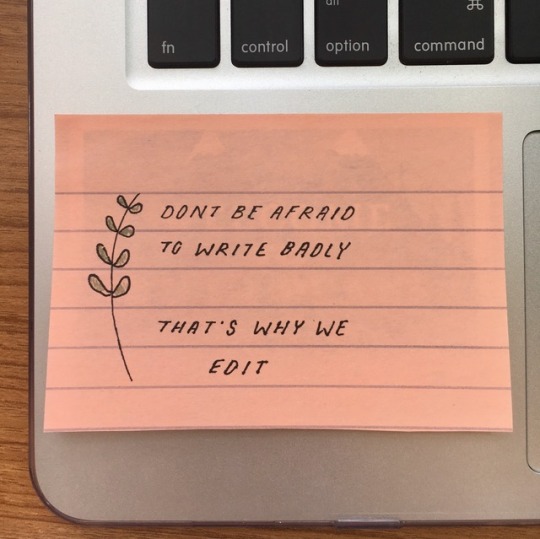
a small wisdom that I need to remember 🌿
25K notes
·
View notes
